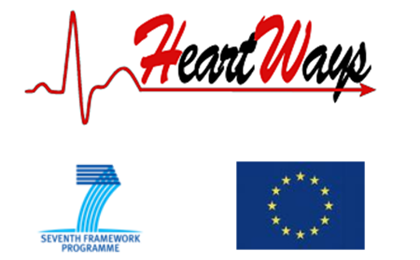
HeartWays

CISUC researchers Paulo de Carvalho and Jorge Henriques talk about their project in Portuguese national television.
HeartWays - Advanced Solutions for Supporting Cardiac Patients in Rehabilitation
Context:
Chronic diseases are diseases of long duration and generally slow progression which are by far the leading cause of mortality in the world. Among all chronic illnesses, cardiovascular diseases (CVDs) are the number one cause of global deaths (more people die annually from CVDs than from any other cause). Furthermore, studies related to economic burden of cardiovascular diseases reveal that CVDs costs to the Health Care Systems of the EU just under 110 billion € in 2006, representing around 10 % of the total EU Health Care expenditure.
Recent research is supportive of the beneficial effects of exercise based cardiac rehabilitation in patients with heart failure as well as in older patients. Unfortunately, exercise based cardiac rehabilitation continues to be considerably underutilized with poor referral and enrolment rates, especially in phase III of the rehabilitation model. Implementing quality performance measures, automated referral systems, and the option of home-based cardiac rehabilitation for some patients may all help to increase participation. In addition, innovative exercise training regimens may help to enhance the beneficial effects of cardiac rehabilitation.
Objectives:
HEARTWAYS has the objective to develop an advanced modular solution for supporting cardiac patients in rehabilitation outside a medicalized centre with the aid of wearable sensors and intelligent algorithms that personalize the management and the follow-up for patients and professionals.
The proposed solution is structured in three different layers. The first one, the monitoring layer, is composed of a combination of smart and wearable sensors, specialized in the monitoring of the vital signs needed for the diagnosis of targeted patients; the second level implements a multiparametric analysis and processing layer that augments the information provided by the standalone monitoring modules and allows a multiparametric assessment of the patient’s status, evolution, performance and predicted CV risk. The last layer is devoted to improve the way patients are managed by healthcare professionals and to create those mechanisms that enable the personalized support to the patient. On the first case, the focus is on enabling a simpler control of patients without reducing the quality of care, increasing the possibilities of handling more patients at the same time and allowing a better adjustment of the available resources to the concrete needs of the individual patients. On the second case, the aim is in increasing the capabilities of the solution to combine the medical needs with the patient’s preferences as well as incorporating a comprehensive motivation and psychological support strategy that complements and reinforces the treatment guidelines.
Click here to see the video: Heartways on TV - RTP 2